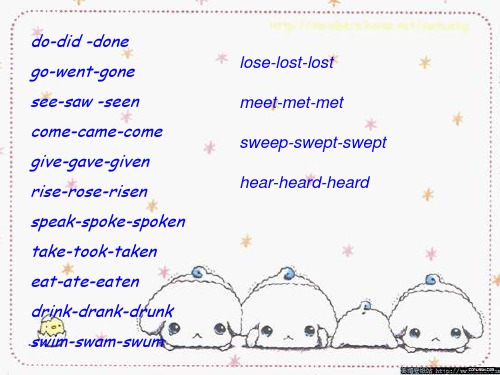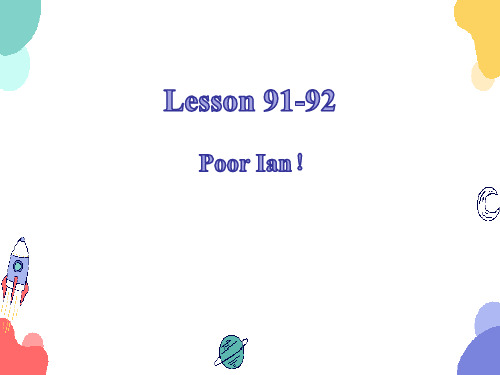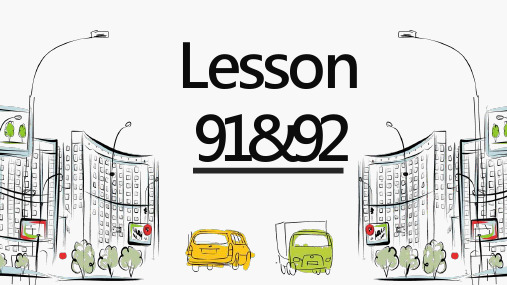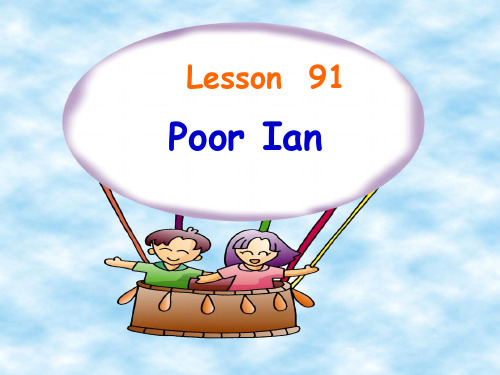新概念英语第一册 第91-92课课件
合集下载
新概念第一册L91-92课ppt课件

最新编辑ppt
8
• We haven't seen the film_______. • A. already B. ever C. yet D. since
最新编辑ppt
9
• Mary isn't here. She has ____ the shop. • A. been to B. went to C. gone to D. /
他是个好人。
in person 亲自,直接的 Eg: He gets the money in person.
他亲自去取钱。
personal adj. 个人的,私人的 Eg:a personal letter
★ people
n. ①人们 Eg:There are a lot of people in the street. 街上有很多人。
• A.don't feel B.hasn't felt
• C.haven't felt D.didn't feel
最新编辑ppt
7
• Mr smith _______to Tokyo and he will be back in a week
• A.has been B.has visited • C.has sent D.has gone
最新编辑ppt
10
Lesson 91 Poor Ian
Move
最新编辑ppt
12
Neighbor
最新编辑ppt
13
• Still /stɪl/还,仍旧 • Move /mu:v/搬家 • Miss /mɪs/想念,思念 • Neighbor /'neɪbə/邻居 • Person /ˈpɜ:sn/人 • People /ˈpi:pl/人们 • Poor /puə/可怜的
新概念1册第91-92课课件

Lesson 91
Poor Ian 可怜的伊恩
★still
① adv. 还是,仍然 • I still can’t decide where to go. • 我还是不能决定去哪。
• She was still beautiful at the age of 46. • 她46岁时仍然美丽。 ② adv. 还要,甚至更 • She looked very ill last week and this week looks
v. 想念,思念 n. 邻居 adv. 还,仍旧 v. 搬家 n. 人 adj. 可怜的 n. 人们
来看这一组句子
He didn’t want to leave this house. No, he didn’t want to leave, but his wife did. 第二个句子是对第一个句子的证实,这里不可以
按照中文习惯去赞同别人的说法,而是要根据 事实来说,因此回答no, he didn’t want to leave. 但是翻译成中文的时候要说,是的,他 不愿意离开。 例句: He didn’t go to school last week, did he?
No, he didn’t. 是的,他没去。 Yes, he did. 不,他去了的。
do-did -done go-went-gone see-saw -seen come-came-come give-gave-given rise-rose-risen speak-spoke-spoken take-took-taken eat-ate-eaten drink-drank-drunk swim-swam-swum
lose-lost-lost meet-met-met sweep-swept-swept hear-heard-heard
新概念第一册Lesson91-92+课件

move /mu:v/ v. ① 搬家 ②移动
eg. ①They moved from Beijing to Changsha.
他们从北京搬到了长沙。 ②Don't move. 别动。
miss /mis/ v. ①想念,思念 ②错过
eg. ①We will miss you if you move. 如果你搬家了,我们会想你的。 ②We missed the bus. 我们错过了那辆公车。
6 people [pi:pəl]n.人们 7 poor [pɔ:] adj.可怜的
still /stil/ adv.还,仍旧
eg. I still want that toy! 我还是很想要那个玩具。
She was still beautifull at the age of 50. 她50岁时依然美丽。
He is seriously ill.He is going to die. He will be twenty years old.
be going to 含有“计划,准备”的意思,而 will 则没 有这个意思,如: She is going to lend us her book. He will be here in half an hour.
92课 When will...?
一般将来时时间状语
T O D AY TOMORBiblioteka OWthis morning
this afternoon
this evening
tonight
TOMORROW tomorrow morning tomorrow afternoon tomorrow evening tomorrow night
afternoon/evening
新概念英语第一册91 92课 完整ppt

Hale Waihona Puke eviewbelieve may how long since why sell because retire cost pound worth penny
v. 相信,认为 可以
多长
prep. 自从 adv. 为什么 v. 卖,出售 conj. 因为 v. 退休 v. 花费 n. 英镑 prep. 值……钱
all
miss
him.
CATHERINE:When will the new people move into
this
house?
JENNY:I think that they'll move in the day after tomorrow.
LINDA : Will you see Ian today, Jenny?
Welcome back!
1.Why does Nigel believe that the house is for sale? 2.How long has Ian lived there? 3.Why does Ian want to sell the house? 4.Why couldn`t Nigel decide? 5.Who has the last word in your family?
Q&A
5.Is Ian a good neighbor ? 6.Will Jenny see Ian today ? 7. Did Ian want to leave this house ? 8. Who wanted to sell this house ? 9.Will Jenny and Catherine miss Ian ?
• move to = move into 搬进。 • people = neighbours • 她是这个职位的合适人选。 • She’s the right person for this job. • 公园里有很多人。 • There’re a lot of people in the park.
新概念第一册L91-92课ppt课件

他是个好人。
in person 亲自,直接的 Eg: He gets the money in person.
他亲自去取钱。
personal adj. 个人的,私人的 Eg:a personal letter
★ people
n. ①人们 Eg:There are a lot of people in the street. 街上有很多人。
一般将来时练习题
( ) 1. There ____C______ a meeting tomorrow afternoon.
A. will be going to
B. will going to be
C. is going to be
D. will go to be
( ) 2. Charlie ___D_____ here next month.
house yet?
副词still也可用于一般现在时, 注意位置在be动词之后。
JENNY: No, not yet. He’s still here.
He’s going to move tommorrow.
最新编辑ppt
24
CATHERINE: When? Tomorrow morning?
JENNY: No. Tomorrow afternoon.
• A.don't feel B.hasn't felt
• C.haven't felt D.didn't feel
最新编辑ppt
7
• Mr smith _______to Tokyo and he will be back in a week
• A.has been B.has visited • C.has sent D.has gone
in person 亲自,直接的 Eg: He gets the money in person.
他亲自去取钱。
personal adj. 个人的,私人的 Eg:a personal letter
★ people
n. ①人们 Eg:There are a lot of people in the street. 街上有很多人。
一般将来时练习题
( ) 1. There ____C______ a meeting tomorrow afternoon.
A. will be going to
B. will going to be
C. is going to be
D. will go to be
( ) 2. Charlie ___D_____ here next month.
house yet?
副词still也可用于一般现在时, 注意位置在be动词之后。
JENNY: No, not yet. He’s still here.
He’s going to move tommorrow.
最新编辑ppt
24
CATHERINE: When? Tomorrow morning?
JENNY: No. Tomorrow afternoon.
• A.don't feel B.hasn't felt
• C.haven't felt D.didn't feel
最新编辑ppt
7
• Mr smith _______to Tokyo and he will be back in a week
• A.has been B.has visited • C.has sent D.has gone
新概念英语第一册第91-92课ppt课件

This story moved me.
6
★neighbour
n. 邻居
neighbourhood
n.四邻,邻近地区
这一带很安静。
This is a quiet neighbourhood.
他要搬到这一带。
He is moving into the neighbourhood.
in the neighbourhood of
10
rain snow leave get up arrive finish work have a holiday drive home
have a haircut telephone me have a shave pack his bags sweep the floor paint this room repair my car
He’s still here.
将来时的时间状语
He’s going to move tomorrow.
be going to 打算做某事
25
将来时的时间状语
CATHERING: When? Tomorrow morning?
JENNY:
No. Tomorrow afternoon.
I'll miss him. 思念,想念 错过
make an appointment
11
02
Practice
12
• still • move • miss • neighbour • person • people • poor
v. 想念,思念 n. 邻居 adv. 还,仍旧 v. 搬家 n. 人 adj. 可怜的 n. 人们
13
03
Game Time
6
★neighbour
n. 邻居
neighbourhood
n.四邻,邻近地区
这一带很安静。
This is a quiet neighbourhood.
他要搬到这一带。
He is moving into the neighbourhood.
in the neighbourhood of
10
rain snow leave get up arrive finish work have a holiday drive home
have a haircut telephone me have a shave pack his bags sweep the floor paint this room repair my car
He’s still here.
将来时的时间状语
He’s going to move tomorrow.
be going to 打算做某事
25
将来时的时间状语
CATHERING: When? Tomorrow morning?
JENNY:
No. Tomorrow afternoon.
I'll miss him. 思念,想念 错过
make an appointment
11
02
Practice
12
• still • move • miss • neighbour • person • people • poor
v. 想念,思念 n. 邻居 adv. 还,仍旧 v. 搬家 n. 人 adj. 可怜的 n. 人们
13
03
Game Time
新概念第一册Lesson 91-92课件

still /stil/ adv.还,仍旧
eg.I still want that toy! 我还是很想要那个玩具。 She was still beautifull at the age of 50. 她50岁时依然美丽。
move /mu:v/ v. ① 搬家
move from...to...从...搬到... eg. They moved from Nanjing to Shenzhen. 他们从南京搬到了深圳。 We are going to move to a house in the country. 我们将要搬到乡下的房子里去。
miss /mis/ v. 想念,思念
1)想念,思念 eg. We will miss you if you move. 如果你搬家了,我们会想你的。 I really miss my hometown. 我真的很想念我的家乡。 2)错过 We missed the bus. 我们错过了那辆公车。
一般将来时
eg. He will not (won't) come back next week. 他下周回不来。 eg. She will not (won't) go to visit her friend this afternoon. 她今天下午不会去拜访她的朋友。
Grammar -
一般将来时
Lesson 91-92
11. Ask me what Ian has always been? What has Ian always been? 12. Ask me when the new people will move into this house? When will the new people move into this house? 13. Ask me if the new people will move in this afternoon? Will the new people move in this afternoon? 14. Ask me if Jenny will see Ian today? Will Jenny see Ian today? 15. Ask me what Linda wants Jenny to do? What does Linda want Jenny to do?
新概念英语第一册91-92课-完整ppt

He is a nice/good person. • 他是个好人。 • in person • 亲自,直接的 • He will go to get the money in person. • 他将亲自去取钱。 • personal • adj. 个人的,私人的 • a personal letter
OK,has Ian sold his house?Maybe yes,maybe no,has he moved to a new house? Now let`s listen to the audio and see if you can answer the question"Who wanted to sell the house?"
Lesson 91Poo源自 Ian本课内容• 单词学习 • 课文讲解 • 练习 • 日常用语 • 作业
Episode
If your father wants to go to the cinema,your mother wants to go shopping,what will they do?
• ★person n.(强调个体,不分男女老少,有复数persons) • The person in a hat is my father.
• ★people n.(强调集体,是集合名词) • How many people are there in your family? • person • n. 人
• He is sitting still. • 他一动不动地坐着。 • 病人安静地躺着。
• The patient is lying still.
• ★move v. 搬家;感动 • 这个故事感动了我。
• This story moves me. • move to 搬到……地方 • move in 搬进 • move out 搬出来 • move away 搬走 • 我们下个月将搬到乡下
OK,has Ian sold his house?Maybe yes,maybe no,has he moved to a new house? Now let`s listen to the audio and see if you can answer the question"Who wanted to sell the house?"
Lesson 91Poo源自 Ian本课内容• 单词学习 • 课文讲解 • 练习 • 日常用语 • 作业
Episode
If your father wants to go to the cinema,your mother wants to go shopping,what will they do?
• ★person n.(强调个体,不分男女老少,有复数persons) • The person in a hat is my father.
• ★people n.(强调集体,是集合名词) • How many people are there in your family? • person • n. 人
• He is sitting still. • 他一动不动地坐着。 • 病人安静地躺着。
• The patient is lying still.
• ★move v. 搬家;感动 • 这个故事感动了我。
• This story moves me. • move to 搬到……地方 • move in 搬进 • move out 搬出来 • move away 搬走 • 我们下个月将搬到乡下
新概念英语第一册L91-92PPT课件

No, he didn’t. 是的,他没去。 Yes, he did. 不,他去了的。
2021/6/4
让家成为孩子钟爱的课堂
▪ 一般将来时表示将来某一时刻的动作或状态,或 将来某一段时间内经常的动作或状态。常常和表 示将来的时间状语连用。如:tomorrow(明天), next week(下周), from now on(从现在开始); in the future(将来)等。 一般将来时由助动词 shall(第一人称),will(第二、三人称) 动词原 形构成。美国英语则不管什么人称,一律用will。
2021/6/4
让家成为孩子钟爱的课堂
Poor Ian 可怜的伊恩
2021/6/4
★still让家成为孩子钟爱的课堂
① adv. 还是,仍然 ▪I still can’t decide where to go. ▪She was still beautiful at the age of 46. ② adv. 还要,甚至更 ▪She looked very ill last week and this week looks still worse.
②民族
He will go to get the money in person.
他将亲自去取钱。
personal adj. 个人的,私人的 a personal letter
person 强调的个体的人,可以有复数形式 persons
people 通常是人的统称,单复数形式相同
2021/6/4
让家成为孩子钟爱的课堂
2021/6/4
让家成为孩子钟爱的课堂
person
n. 人 He is a nice/good person.
他是个好人。
2021/6/4
让家成为孩子钟爱的课堂
▪ 一般将来时表示将来某一时刻的动作或状态,或 将来某一段时间内经常的动作或状态。常常和表 示将来的时间状语连用。如:tomorrow(明天), next week(下周), from now on(从现在开始); in the future(将来)等。 一般将来时由助动词 shall(第一人称),will(第二、三人称) 动词原 形构成。美国英语则不管什么人称,一律用will。
2021/6/4
让家成为孩子钟爱的课堂
Poor Ian 可怜的伊恩
2021/6/4
★still让家成为孩子钟爱的课堂
① adv. 还是,仍然 ▪I still can’t decide where to go. ▪She was still beautiful at the age of 46. ② adv. 还要,甚至更 ▪She looked very ill last week and this week looks still worse.
②民族
He will go to get the money in person.
他将亲自去取钱。
personal adj. 个人的,私人的 a personal letter
person 强调的个体的人,可以有复数形式 persons
people 通常是人的统称,单复数形式相同
2021/6/4
让家成为孩子钟爱的课堂
2021/6/4
让家成为孩子钟爱的课堂
person
n. 人 He is a nice/good person.
他是个好人。
新概念英语第一册lesson91-92课件

★miss v. 想念,思念 ① v. 想念,惦念 • I miss you. ② v. 错过 他起晚了,错过了那班火车。 • He got up late and missed that train.
• • • •
★ person n.人 (强调个体,不分男女老少,有复数persons) The person in a hat is my father. He is a nicБайду номын сангаас/good person.他是个好人。
• He is going to paint this bookcase tomorrow. • I am going to spend the holiday next week. • They are going to buy some fruit this evening. be going to do 计划/打算做某事,表将来 • • • • He will go to America tomorrow. I will buy a car next year. They will have a party tomorrow evening. will do 将要……,表将来
you see Ian today, Jenny? Jenny: Yes, I will. Linda:Please give him my regards. Catherine: Poor Ian! He didn't want to leave this house. Jenny: No, he didn't want to leave, but his wife did.
一般将来时
表示将来将要发生的动作或事情 be going to do 计划/打算做……
新概念第一册Lesson-91-92new课件

2022/2/1
•
today
• today既可以跟将来时,也可以跟过去 时。
• I will go to see a movie today.
• I saw a movie today.
• 第一句指今天晚些时候,事情还没做 第二句指今天早些时候,事情已经做 了。
• Please give him my regards. • give sb. sth. = give sth. to sb. 给某人某
2022/2/1
肯定句
一般将来时的肯定、否定和疑问句
shall + 动词原形 I shall ,We shall will + 动词原形
否定句
shall + not + 动词原形 will + not +动词原形
疑问句
Shall 提前,放在句首。Shall I,Shall we Will 提前,放在句首。
JENNY: No, not yet.
He’s still here.
将来时的时间状语
He’s going to move tomorrow.
be going to 打算做某事
2022/2/1
课文Move to 搬到… • -Has he moved to讲hi解s new house yet?
• -No, not yet. • move in 搬进move out 搬出来 • 第二个意思
2022/2/1
Grammar - 一般将来时
疑问句: - Will you see him tomorrow morning?
你明天早晨会见他吗? - Yes, I will.
No, I won't.
•
today
• today既可以跟将来时,也可以跟过去 时。
• I will go to see a movie today.
• I saw a movie today.
• 第一句指今天晚些时候,事情还没做 第二句指今天早些时候,事情已经做 了。
• Please give him my regards. • give sb. sth. = give sth. to sb. 给某人某
2022/2/1
肯定句
一般将来时的肯定、否定和疑问句
shall + 动词原形 I shall ,We shall will + 动词原形
否定句
shall + not + 动词原形 will + not +动词原形
疑问句
Shall 提前,放在句首。Shall I,Shall we Will 提前,放在句首。
JENNY: No, not yet.
He’s still here.
将来时的时间状语
He’s going to move tomorrow.
be going to 打算做某事
2022/2/1
课文Move to 搬到… • -Has he moved to讲hi解s new house yet?
• -No, not yet. • move in 搬进move out 搬出来 • 第二个意思
2022/2/1
Grammar - 一般将来时
疑问句: - Will you see him tomorrow morning?
你明天早晨会见他吗? - Yes, I will.
No, I won't.
新概念英语一册91-92课课件

• Please give him my regards. • give sb. sth. = give sth. to sb. 给某人某 物=把某物给某人 • 请代我们问候你的父母 • Please give your parents our regards. • Please give our regards to your parents. • Poor Ian! 同情某人时的常用语。
★miss v. 想念,思念 ① v. 想念,惦念 • 我想你 • I missed you. ② v. 错过;未做到 • 他睡过了头,错过了他那班火车。 • He overslept and missed his train.
• ★person n.(强调个体,不分男女老少,有复数persons) • The person in a hat is my father. • ★people n.(强调集体,是集合名词) • How many people are there in your family? • person n. 人 He is a nice/good person. • in person • personal 亲自,直接的 adj. 个人的,私人的
• Eg:I’ll miss him.(I’ll=I will) • We’ll all miss him.(we’ll=we will) • They’ll move in the day after tomorrow.(they’ll= they will) • 构成:主语+助动词will/shall+动词原形 (shall可用于第一人称I, we)
• Eg:明天我将去美国。 • I will go to America tomorrow.
新概念第一册英语Lesson91-Lesson92课件

二、句型转换
• 1. I will go to Beijing tomorrow.(同义句) • 2.He will leave next month. (同义句) • A: He _____ ______ ______ leave next month. • B: He ______ ________ next month. • 3. We will have our lunch together. (一般疑问句) • 4.They will move to their new house next month. • (否定句)
at 12:00.
一般将来时的构成(二)
• 肯定句:主语+will+动词原形 • will为助动词,与情态动词用法相同,与动
词原形构成谓语,不需要根据人称进行变 化。 • 缩写:I will=I’ll • she will = she’ll • he will=he'll • they will= they’ll
Lesson 91
Poor Ian
★move
• 1. v. 搬家 • 短语: • move to/into +地点 搬到……地方 • move in 搬进(后面不能接宾语)
• 2.感动 • This story moves me.
★miss
① v. 想念,惦念 miss+人 想念某人 I miss my grandmother very much.
三、时态综合练习 --- 用所给词的适当形式填空
• 1.My father (go) back next Sunday. Then he can take me to the Great Wall.
• 2.Peter (go) back home at seven this evening.
新概念英语第一册91-92课最新版本ppt课件

最新版整理ppt
11
一般将来时
• 一般将来时表示将来某一时刻的动作或状 态,或将来某一段时间内经常的动作或状
态。常常和表示将来的时间状语连用。如: tomorrow(明天), next week(下周), from now on(从现在开始);in the future (将来)等。 一般将来时由助动词shall (第一人称),will(第二、三人称) 动词
最新版整理ppt
22
将来时的时间状语
CATHERING: When? Tomorrow morning?
JENNY: No. Tomorrow afternoon.
I'll miss him. 思念,想念 错过
have / has been + 形容词 “一直都很…”
He has always been a good neighbour.
原形:sell 过去 现在完成时的标志词
CATHERING: Has 式Ian:soslodldhis house yet?
JENNY: Yes, he has. 表示过去的时间状语
He sold it last week.
CATHERING: Has he moved to his new house yet?
未能
I missed buying the magazine. 我未能买到那本杂志。
I missed seeing him yesterday. 昨天我未能/没看见他。
③注意到…的不存在
• When did you miss your bag? • 你什么时候发现提包不见的?
poor
dj. ①可怜的 he poor old woman had no one to talk to. 那个可怜的老人找不到人跟她说话。 ②贫穷的 rich poor man 贫穷的人 he poor 穷人 We should help the poor. ③笨拙的,差劲的 e good at sth./be good at doing sth.
- 1、下载文档前请自行甄别文档内容的完整性,平台不提供额外的编辑、内容补充、找答案等附加服务。
- 2、"仅部分预览"的文档,不可在线预览部分如存在完整性等问题,可反馈申请退款(可完整预览的文档不适用该条件!)。
- 3、如文档侵犯您的权益,请联系客服反馈,我们会尽快为您处理(人工客服工作时间:9:00-18:30)。
• He has always been a good neighbour. • 现在完成时 • 指Ian自从在这住开始到现在一直都很 好 • He’s a very nice person. • 表达人的人品很好可以用good或nice。 • person 强调的个体的人,可以有复数 形式persons • people 通常是人的统称,单复数形式 相同people
• Please give him my regards. • give sb. sth. = give sth. to sb. 给某人某 物=把某物给某人 • 请代我们问候你的父母 • Please give your parents our regards. • Please give our regards to your parents. • Poor Ian! 同情某人时的常用语。
• poor
• adj. ①可怜的 • The poor old woman had no one to talk to. • 那个可怜的老人找不到人跟她说话。 • ②贫穷的 • a poor man • 贫穷的人 富裕的人 rich
• the poor
• 穷人
the rich
ห้องสมุดไป่ตู้
• We should help the poor. • ③笨拙的,差劲的 • be good at sth./be good at doing sth. • be poor at sth./ be poor at doing sth. • 不擅于…
Welcome back!
July27th
1.Why does Nigel believe that the house is for sale?
2.How long has Ian lived there?
3.Why does Ian want to sell the house? 4.Why couldn`t Nigel decide? 5.Which one has the last word in your family?
do-did -done
go-went-gone see-saw -seen come-came-come give-gave-given
lose-lost-lost meet-met-met sweep-swept-swept
rise-rose-risen
speak-spoke-spoken take-took-taken eat-ate-eaten drink-drank-drunk
• • • • • • • • •
★move v. 搬家;感动 这个故事感动了我。 This story moves me. move to 搬到……地方 move in 搬进 move out 搬出来 move away 搬走 我们下个月将搬到乡下 We'll move to the country next month.
5.The boss has already left.(划线提问)
Lesson 90
Have you . . . yet?
希望英语培训中心
Lesson 91
Poor Ian
本课内容
• • • • • 单词学习 课文讲解 练习 日常用语 作业
Episode
If your father wants to go to the cinema,your mother wants to go shopping,what will they do? OK,has Ian sold his house?Maybe yes,maybe no,has he moved to a new house? Now let`s watch our audio and answer the question"Who wanted to sell the house?"
单词学习
• • • • • • • still move miss neighbour person people poor adv. 还,仍旧 v. 搬家 v. 想念,思念 n. 邻居 n. 人 n. 人们 adj. 可怜的
★still adv. 还,仍旧 ① adv. 还是,仍然 • 我仍然不知道他是什么意思。 • I still don’t understand what he meant. ② adv. 还要,甚至更 • 她上周看起来病得很严重,这周更严重了。 • She looked very ill last week and this week looks still worse. ③ adv. 静止地;安静地 • He is sitting still. • 他一动不动地坐着。 • 病人安静地躺着。 • The patient is lying still.
• • • • • • •
-He didn’t want to leave this house. -No, he didn’t, but his wife did! 反意疑问句: -He didn’t go to school yesterday, did he? -No, he didn’t.(是的,他没去。) Yes, he did.(不,他去了。) 注意没有混搭形式:Yes, he didn’t. / No, he did.
Homework:
1.听并模仿新一73-93课每天早晚各1遍; () 2.朗读背诵91课给家长听,认真复习75-91 课笔记,每天复习1遍() 3.抄写91-92课单词每个1遍,翻译1遍,默1 遍完成课后92课课后练习() 4.听并默写第93课() 5.做力所能及的事,家长签字评语,—— —————
★miss v. 想念,思念 ① v. 想念,惦念 • 我想你 • I missed you. ② v. 错过;未做到 • 他睡过了头,错过了他那班火车。 • He overslept and missed his train.
• • • • • • • • • • •
★person n.(强调个体,不分男女老少,有复数persons) The person in a hat is my father. ★people n.(强调集体,是集合名词) How many people are there in your family? person n. 人 He is a nice/good person. 他是个好人。 in person 亲自,直接的 He will go to get the money in person. 他将亲自去取钱。
• • • • • • •
still move miss neighbour person people poor
v. 想念,思念 n. 邻居 adv. 还,仍旧 v. 搬家 n. 人 adj. 可怜的 n. 人们
• • • • •
课文讲解
-Has he moved to his new house yet? -No, not yet. Move to 搬到… 我明天要搬到B区的办公室。 I’ll move to the office in zone B tomorrow. • Yet用于疑问句和否定句的句尾。 • No, he has not moved to his new house yet.
• When will the new people move into this house? • move to = move into 搬进。 • people = neighbours • 她是这个职位的合适人选。 • She’s the right person for this job. • 公园里有很多人。 • There’re a lot of people in the park.
一般将来时
①表示将来将要发生的动作 ②tomorrow, next year this month the day after tomorrow the year after the next in five hours‘ time …
③结构: 主语+助动词will/shall+动词原形(shall可用于第一人称I, we) I will go to America tomorrow. 明天我将去美国。 Jack will move into his new house tomorrow morning. 今晚杰克将要搬进新家。 ★变疑问句 Will you go to America tomorrow? Will Jack move into his new house tomorrow morning? ★变否定句(shan’t/ won’t) I will not go to America tomorrow. Jack will not move into his new house tomorrow morning. ★肯定回答及否定回答 Yes, I will. / No, I will not. Yes, he will. / No, he will not. ★特殊疑问句 When will you go to American? When will Jack go to American?
• He’s still here. = He is still here. • 副词still也可用于一般现在时,注意位 置在be动词之后。 • He’s going to move tomorrow. • be going to do 计划、打算做某事。 • I’ll miss him. = I will miss him • I miss home very much. • He missed the train yesterday. • I miss you because I missed you.
•
• •
personal
